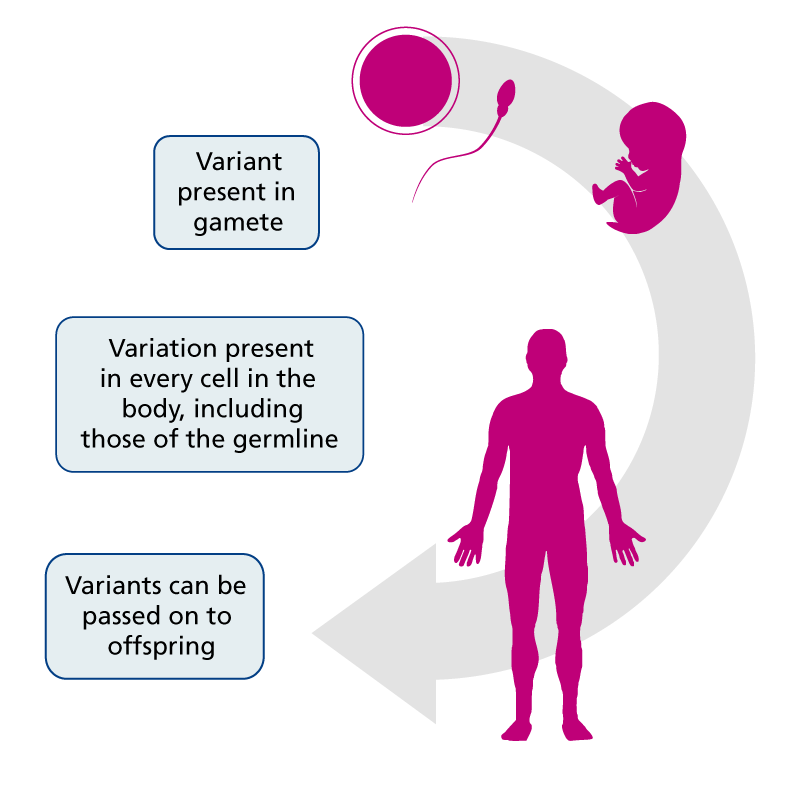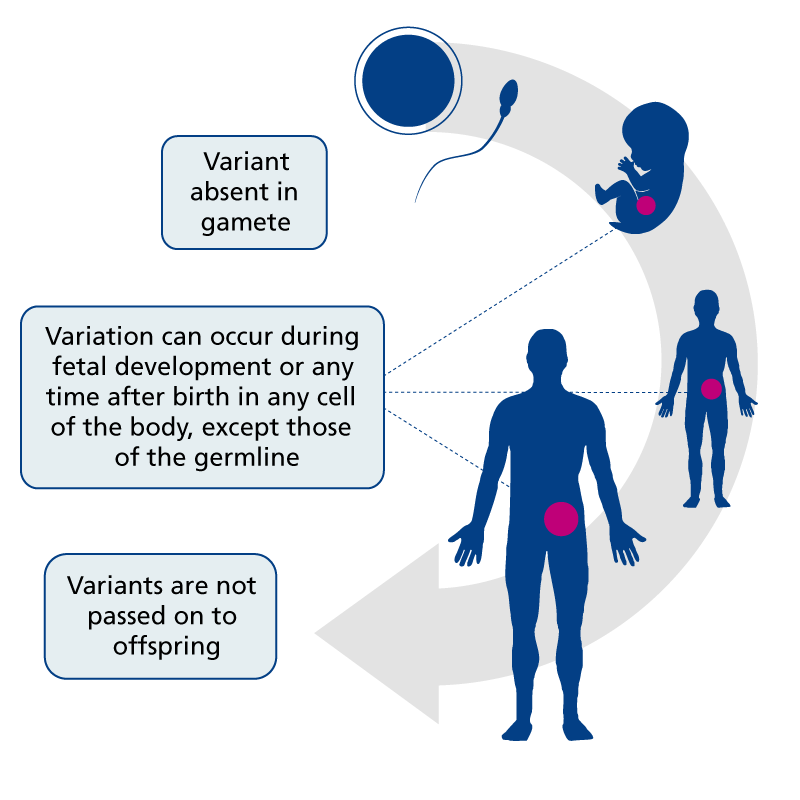Constitutional (germline) vs somatic (tumour) variants
Constitutional (also known as germline) variants are present in all the body’s cells, including the germ cells, and can therefore be passed on to offspring; somatic variants arise during an individual’s lifetime in tissues other than the germ cells and so are not passed on.
Where do variants come from?
Variants in a person’s genome can be inherited from either or both parents, or they can arise in a person’s DNA for the first time, which is known as a de novo variant, or a new variant. Variants may also be referred to as mutations, especially when referring to those associated with cancer.
De novo variants can arise during natural cellular processes, such as cell growth and division, or as a result of exposure to environmental factors, such as smoking, UV light or other harmful agents. Sophisticated mechanisms exist within our cells to prevent or reduce the chance of this happening, but sometimes changes are not detected and new variation is introduced.
Depending on the type of cell that the new variant has been introduced into, the variant may or may not be passed on to future generations. Variants in somatic cells cannot be passed on from one generation to the next, whereas both inherited and de novo variants in germline cells can be.
Constitutional (germline) variants
- Any variant that occurs in a gamete (egg or sperm) or cells that produce gametes (germ cells) is termed a constitutional, or germline, variant. The resulting embryo and baby will have the variant in every cell of their body that contains a copy of the genome, including the cells that produce their own gametes (see figure 1). The variants could therefore be passed on to their offspring, who in turn could pass the variants on to their offspring and so on.
- When considering inheritance of a genetic condition, it is those that are the result of a constitutional (germline) variant that have implications for the patient’s relatives.

Figure 1: Constitutional (germline) variants.
Somatic variants
- Cells that are not part of the germline are called somatic cells, and any changes to the DNA that occur within these cells are known as somatic variants. Somatic variants are not present in every cell in the body, and are not passed from parent to child.
- A somatic variant can be present in a large number of cells in the body or just a few, depending on when in a person’s lifetime the new variant occurs. If the change occurs early in embryo development, a large proportion of the individual’s cells may contain the new variant. If the change occurs later in development, then it may only be present in a particular tissue type, or only part of a tissue (see figure 2). This results in different cells in the body having slight differences in their genomes – some with the variant and some without – known as mosaicism.

Figure 2: Somatic variants.
Clinical example: Cancer
- Most cancers are a result of somatic mutations, which is why many cancers are localised to a particular organ or tissue of the body.
- In the context of cancer, the term ‘somatic mutations’ refers to those changes that have accumulated in the cancer genome, either as drivers of oncogenesis or as passenger mutations, but are not present constitutionally in the individual.
- Constitutional (germline) variants in cancer predisposition genes are present in affected individuals in all the body’s nucleic cells, as well as the cancer genome, and may therefore be inherited. These underlie inherited cancer predisposition syndromes, such as Lynch syndrome and hereditary breast and ovarian cancer syndrome.
Watch the video to hear honorary consultant in clinical genetics Professor Clare Turnbull talk about the “two different genomes” that are relevant in oncology.
Key messages
- Constitutional (also known as germline) variants are present in all the body’s cells, including the germ cells, and can therefore be passed on to offspring.
- Somatic variants arise during an individual’s lifetime in tissues other than the germ cells and so are not passed on to offspring.
- Somatic variants can be present in a large number of cells in the body or just a few, depending on when in a person’s lifetime the new variant occurs.
Resources
For clinicians
- NHS England’s Genomics Education Programme: Genomics 101: Inheriting Genomic Information
- NHS England: National Genomic Test Directory and eligibility criteria